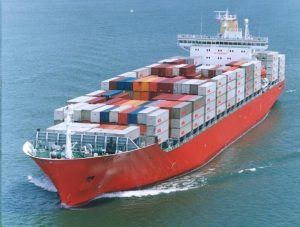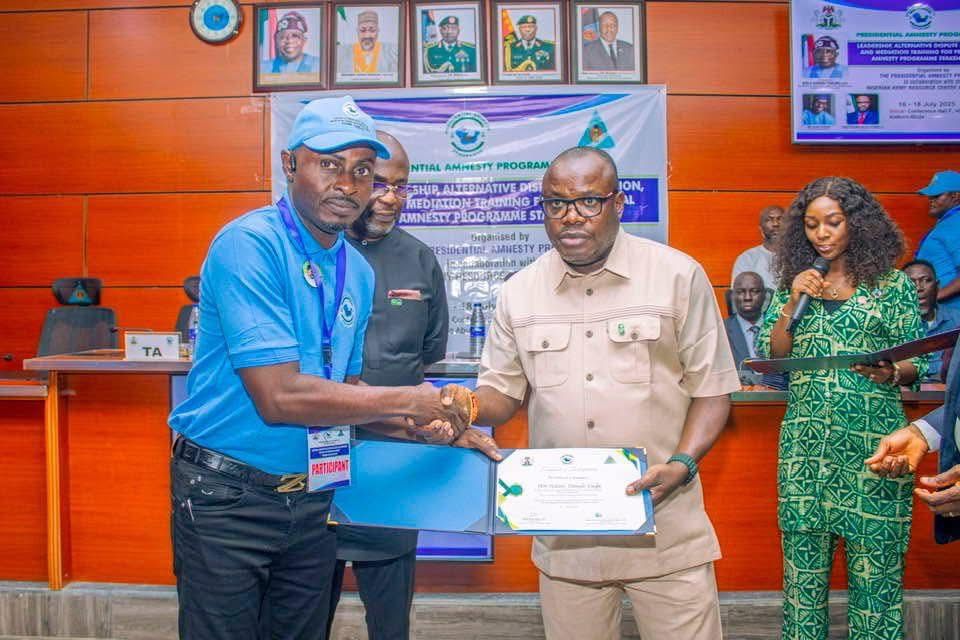Business
According to the World Shipping Council (WSC), Nigeria and other countries transport approximately $7 trillion worth of goods by sea every year.

According to the World Shipping Council’s report, over $7 trillion worth of goods are transported annually via international liner ship operators, who offer more than 2,000 regularly scheduled services. The Washington DC-based organization highlighted these findings on its website.
The seas witness the transportation of 241 million containers annually, carrying goods valued at over $7 trillion. With intense competition in this market, more than 100 international liner ship operators offer over 2,000 regularly scheduled services, facilitating global trade between nations on a weekly basis.
The COVID-19 pandemic strained supply chains, causing unpredictable demand and resulting in increased shipping rates. However, as the world moves towards normalcy, the global supply network is stabilizing, and both rates and reliability are returning to pre-pandemic levels, as mentioned in the report.
The World Shipping Council (WSC) reported a significant drop in container losses at sea in 2022, with only 661 containers lost. This decline is primarily attributed to fewer substantial losses compared to previous years.
The council emphasized that the loss of 661 containers represents a mere 0.00026% of the total volume of cargoes shipped worldwide each year, indicating a significantly low loss rate.
Furthermore, the report highlighted an increase in the average number of containers lost annually between 2020 and 2022, with 2,301 containers lost on average during this period. This figure represents a substantial rise compared to the previous three years, which averaged 779 containers lost per year.The World Shipping Council acknowledged that the reported number of container losses reflects the industry’s efforts in enhancing container safety. However, it also emphasized that this figure serves as a reminder of the ongoing need for constant vigilance to protect the well-being of crews, safeguard valuable cargo, and preserve the environment.
“Over the 15-year period surveyed (2008–2022), an average of 1,566 containers were lost at sea each year.
“However, yearly losses can vary widely due to significant loss incidents, such as the MV Rena incident in 2011 where 900 containers were lost and the MOL Comfort incident in 2013, where a record 4,293 containers were lost when the ship sank in the Indian Ocean,” it stated.
According to the council, an unusually high number of weather-related incidents in 2020 and 2021 led to an average loss of 3,113 containers lost over the two years.
It added, “The spike can be attributed to significant container loss incidents in the Pacific Ocean, including the ONE Apus, which lost more than 1,800 containers in severe weather in November 2020, and the Maersk Essen, which also experienced severe weather in 2021 that resulted in the loss of some 750 containers overboard.”
The Chief Executive Officer of WSC, John Butler, said in the report, “The reduction in containers lost at sea in 2022 is positive news. However, we cannot afford complacency. We are committed to making the sea safer for work, protecting the environment and cargo by reducing the number of containers lost at sea.”
He explained that the safety of containers was a shared responsibility across the supply chain. “Key factors include proper packing, stowage, securing of containers, and accurate weight reporting. Daily, liner carriers collaborate with partners to prevent incidents and ensure safe container transport.
“Working with governments and stakeholders to minimise container losses at sea, the liner shipping industry continues to strive towards enhancing container safety. In 2021, WSC and several member lines, alongside maritime stakeholders, initiated the MARIN Top Tier project,” he explained.
According to him, the project’s research provides data on the causes of containers overboard and measures to prevent such incidents, adding that the research includes the production of training materials, videos, and calculators to help mitigate dangerous situations.
Business
Dangote Refinery Boosts Fuel Exports as Gulf Refineries Shut Down

By: Fabian Apechihin
The Dangote Petroleum Refinery has ramped up fuel exports to international markets amid widespread refinery shutdowns in the Middle East, industry sources confirmed.
A senior official at the $20bn Lagos-based plant told The PUNCH that the facility exported significant volumes of petrol (PMS), diesel (AGO), and aviation fuel (Jet A1) to foreign buyers in August, following earlier shipments in June and July.
The surge comes as Saudi Aramco and other regional producers face heavy maintenance schedules, tightening fuel supply. Aramco has already shut down two plants and plans further closures, including its 460,000 b/d Satorp refinery in Jubail for a 60-day turnaround in November–December. Kuwait and India are also scaling back capacity for maintenance and seasonal demand.
According to Argus Media, these shutdowns are pushing Gulf nations to import record volumes of gasoline, with Saudi Arabia and the UAE sharply increasing purchases from Europe and other markets in recent months.
While some reports pointed to operational constraints at Dangote’s 650,000 b/d facility, the company dismissed such claims, insisting production is on track to reach 700,000 b/d by December. Earlier this year, Aliko Dangote announced the refinery had sold two cargoes of jet fuel to Saudi Aramco and recently achieved exports of about 1 million tonnes of petrol between June and July.
“With Gulf refiners offline, Nigeria has now emerged as a net exporter of refined products,” Dangote said.
Analysts suggest the extended refinery outages in the Middle East will further strengthen demand for Dangote’s output, positioning the Nigerian plant as a key supplier in regional fuel markets.
Would you like me to tighten this further into a 5–6 paragraph wire-style news brief, or keep it as a detailed feature-style report with more context on Gulf refinery shutdowns?
Business
US Oil Exports to Nigeria, Others Fall to 3.3m bpd as Local Output Rises

By: Fabian Apechihin
The United States’ crude oil exports to Nigeria and other African countries fell for the fifth consecutive month in July 2025, averaging 3.3 million barrels per day (bpd), the lowest level since March 2022.
The Organisation of Petroleum Exporting Countries (OPEC) disclosed this in its August 2025 Monthly Oil Market Report (MOMR), attributing the decline to weaker flows to Europe and Africa, particularly Nigeria, but without giving further details.
Industry analysts link the slowdown to the ramp-up of local refining capacity, especially the 650,000 bpd Dangote Refinery, which has reduced Nigeria’s reliance on imported crude, including from the US. Vanguard checks also show that crude importation has slowed further in recent months due to improved domestic production.
According to OPEC data, Nigeria’s crude oil output—excluding condensates—rose by 11 per cent year-on-year to 1.559 million bpd in July 2025, up from 1.386 million bpd in the same period of 2024. This marks the country’s highest monthly production level so far this year.
The Nigerian Upstream Petroleum Regulatory Commission (NUPRC) corroborated the figures, stating that overall output, including condensates, exceeded 1.8 million bpd in July.
Gbenga Komolafe, Chief Executive of the NUPRC, said the milestone was achieved through the agency’s “Project 1 MMBOPD Incremental” initiative, supported by a multi-stakeholder collaborative framework.
“We are glad to report that we crossed the 1.8 million bpd mark on peak production last month, with average production hovering at 1.78 million bpd,” Komolafe stated.
He added that the Commission is working to sustain production growth by optimising the Maximum Efficient Rate (MER) framework, improving produced water management, and aligning operational shutdowns and maintenance schedules to minimise disruptions.
“With these measures and continued collaboration, the presidential mandate on production increase is well within reach,” he said.
Do you want me to make this rewrite more concise for a newspaper front-page brief or keep it detailed like a full energy market report?
Business
NDYPC Hails Otuaro’s Reforms in Presidential Amnesty Programme

• Lauds transparency, fairness in beneficiary selection and grassroots empowerment
• Says reforms align with Tinubu’s Renewed Hope Agenda, restore trust in Niger Delta
The Niger Delta Youths for Positive Change (NDYPC) has commended the Administrator of the Presidential Amnesty Programme (PAP), Dr. Dennis Otuaro, for what it described as bold, people-focused reforms that are restoring trust and delivering tangible benefits to the Niger Delta.
In a statement signed and issued by Comrade Elliott Yibakeni, after the conclusion of leadership training sessions with ex-agitator leaders in Abuja, the group said the PAP, once in urgent need of renewal, is now undergoing a transformation that reflects transparency, fairness, and accountability.
“At a time when public trust in institutions was waning, Dr. Otuaro has emerged as a symbol of credibility and transformation,” the statement read. “His visionary leadership is restoring integrity, empowering communities, and driving a sustainable development agenda that resonates with the aspirations of the Niger Delta.”
According to NDYPC, under Otuaro’s leadership, beneficiary selection has become fair and merit-based, ending years of favoritism and political interference. The group added that access to education, skills training, and empowerment opportunities, both locally and abroad, is now guided by equity and open competition.
The group highlighted several internal reforms, including improved staff welfare, strengthened professional capacity, and strict adherence to best practices in public procurement. These, it said, have made the PAP more efficient, responsive, and transparent.
NDYPC also praised Otuaro’s inclusive governance style, noting his sustained engagement with traditional rulers, women leaders, civil society organizations, and local communities. This approach, the group said, has strengthened peace-building efforts and deepened trust between the PAP and the people it serves.
In line with President Bola Ahmed Tinubu’s Renewed Hope Agenda, the PAP has maintained consistent payment of stipends to ex-agitators and extended direct support to vulnerable populations. NDYPC also applauded new healthcare interventions for ex-agitators facing health challenges.
The statement further commended the programme’s investments in scholarships, vocational training, and economic empowerment initiatives aimed at preparing Niger Delta youths for leadership, innovation, and sustainable livelihoods.
“Every decision reflects a deep commitment to public trust, responsible stewardship, and long-term development,” NDYPC stated. “Under Dr. Otuaro’s watch, the Niger Delta is rising stronger, united, and filled with renewed hope.”
-

 Uncategorized5 years ago
Uncategorized5 years agoFG, states urged to harness flooding for ranching, others with technology – Agbaje
-

 Headlines10 years ago
Headlines10 years agoBreaking: EFCC seals Borno House of Assembly, as Hon members take to their heels
-

 News11 years ago
News11 years agoNigeria Security Operatives Stage Manhunt For Homosexual Perpetrator
-

 News9 years ago
News9 years agoHow 21-year-old Girl fled community over accusation of lesbianism
-

 News10 years ago
News10 years agoYobe Gov Moves Against Deputy
-

 Opinion7 years ago
Opinion7 years ago7 signs she has friend zoned you
-
Technology4 years ago
Online job placement company headhunts women
-

 Headlines10 years ago
Headlines10 years agoBorno Dep Gov Abducts Another Church Leader





